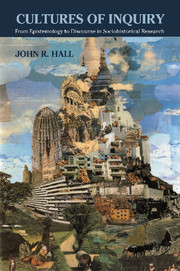Book contents
- Frontmatter
- Contents
- List of tables and figures
- Acknowledgments
- Prologue
- 1 Introduction: the Third Path
- PART I FORMATIVE DISCOURSES
- 2 Value discourse and the object of inquiry
- 3 Narrative cultures and inquiry
- 4 The conceptual possibilities of social theoretical discourse
- 5 The core of explanation and interpretation as formative discourse
- PART II PRACTICES OF INQUIRY
- Notes
- Bibliography
- Index
4 - The conceptual possibilities of social theoretical discourse
Published online by Cambridge University Press: 22 September 2009
- Frontmatter
- Contents
- List of tables and figures
- Acknowledgments
- Prologue
- 1 Introduction: the Third Path
- PART I FORMATIVE DISCOURSES
- 2 Value discourse and the object of inquiry
- 3 Narrative cultures and inquiry
- 4 The conceptual possibilities of social theoretical discourse
- 5 The core of explanation and interpretation as formative discourse
- PART II PRACTICES OF INQUIRY
- Notes
- Bibliography
- Index
Summary
Rejecting social theory is easier said than done. Deconstruction, for instance, purports to show how elisions shape theoretical systems of analysis by their vital absences. Yet deconstruction itself is deeply theoretical. On a different front, Margaret Somers's archeology of the concept of “citizenship” shows that theoretical concepts are cultural products, heavily freighted with ideological baggage that often becomes invisible in “naturalized” academic discourse. As Somers emphasizes, historicity means that there can be no ultimate foundations for social theory. Given both the ubiquity and historicity of social theoretical discourse, its role in sociohistorical inquiry calls for clarification.
As Martin Jay has artfully suggested, opponents can only submerge their theoretical acts, not purge them. This does not mean that theory must be embraced, only that it ought to be engaged. Peoples subjected to domination rightly wonder whether they ought to learn the category systems of their oppressors or displace them. But Henry Louis Gates argues that black literary critics are better served by selectively reconstructing theory within a black vernacular idiom rather than abandoning it. Gates will neither dismiss theory nor fetishize it. This approach strikes me as reasonable for theory more generally. In this chapter, I consider social and cultural theories rather than literary ones. And as important as the development of vernacular idioms is, I concentrate on the other side of the dialectic – understanding theories in their basic conceptual and methodological construction, how they work, and to what effect.
- Type
- Chapter
- Information
- Cultures of InquiryFrom Epistemology to Discourse in Sociohistorical Research, pp. 104 - 149Publisher: Cambridge University PressPrint publication year: 1999



